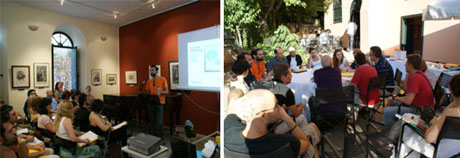by György Kovács
The LUDUS project aims to create a European network for the transfer of knowledge and dissemination of best practices in the innovative field of serious gaming.
The South East Europe Transnational Cooperation Programme of the EU (SEE) aims to develop transnational partnerships on matters of strategic importance, in order to improve the territorial, economic and social integration process and to contribute to cohesion, stability and competitiveness of the region. To this end, the programme seeks to realize high quality, result-oriented projects with a strategic focus, relevant for the programme area.
Serious games (SG) are well summarized in [1]. The term "serious game" was actually used long before the introduction of computer and electronic devices into entertainment by Clark Abt, who introduced the concept in his 1970 book Serious Games [2]. He gave a useful general definition, which is still applicable in the computer age:
“A game is an activity among two or more independent decision-makers seeking to achieve their objectives in some limiting context. A more conventional definition would say that a game is a context with rules among adversaries trying to win objectives. We are concerned with serious games in the sense that these games have an explicit and carefully thought-out educational purpose and are not intended to be played primarily for amusement.”
Gaming has been used in educational circles since at least the 1900s. Use of paper-based educational games became popular in the 1960s and 1970s, but waned under the Back to Basics teaching movement. (The aim was to focus on students’ poor reading, writing and arithmetic). With the proliferation of computers in the 1980s, the use of educational games in the classroom became popular, with titles that included Oregon Trail, Math Blaster, and Number Munchers.
These days, SGs are generally considered to be applications, developed with game technology and design principles, whose primary purpose is to train, to simulate situations, or to educate while entertaining the user. Serious games tend to be very effective and pervasive as they partially hide learning, the user has an active role in them, and they are almost always amusing.
The LUDUS consortium has eight partners from six countries: PROMEA and BIC (Greece), POLIMI and UNIMIB (Italy), ARIES (Romania), BSC (Slovenia), BIA (Bulgaria), and INNOSTART (Hungary). (In the last ten months of the project INNOSTART resigned and was substituted by SZTAKI in Hungary). LUDUS is a real South-East European consortium containing different types of organizations, including: a research institute, an innovation centre, an industrial association, a university, a didactical centre and a development agency.
The project had several ambitious goals and targets ranging from theoretical analytical studies to practical applications of SGs, including networking in a physical and human sense, and applying knowledge management. Some basic goals include:
- understanding and analysing the state of the art in serious gaming by bringing together SG stakeholders with IT companies and developers.
- to promote SG for different partners by means of organization of European training courses, competitions, etc., by supporting knowledge transfer, by setting up a web-based collaboration and knowledge management platform, hosting database with experts, documents, outcomes.
- support new research and development in serious gaming.
- achieve (in the longer term) a more intensive use of technology for learning/training purposes and innovation in Europe.
The target groups of LUDUS are local SMEs and enterprises, IT companies, scientific and engineering associations, chambers of commerce, regional development agencies, press, media, teachers, trainers, educational experts, decision makers, training companies, students, gamers and even the general public.
Interaction between developers and users, as well as feedback from the latter, is necessary in order to make improvements and enable the field of serious gaming to achieve its full potential. Users and others are encouraged to submit their comments on functionality, themes and application of SG facilities, through the project’s communication tools. LUDUS wishes to offer these communication tools as a space for the exchange of opinions and the birth of new ideas, attracting and involving all stakeholders.

Infoday and regional networking workshop in Athens (19 June 2012)
Some main events during the project’s life-cycle to date include:
- a kick off meeting in Ioannina, Greece and a project meeting in Milan, Italy
- three info days in Italy, Romania and Bulgaria
- an open Brainstorming meeting in Slovenia
- Knowledge Sharing Regional Training Course in Italy
- The Game Barometer – A survey on the subject of SGs
- two European best learning game competitions - Romania and Slovenia
- two international conferences, Iioannina and Milan
- Serious Gaming Open Learning Lab, Milan
- Infoday and regional networking workshop in Athens, Greece (see Figure 1)
These meetings and open events attracted several hundred participants in each country, representing all target groups. Competitions were organized in different categories, for different size enterprises with several competing teams.
LUDUS is funded (up to 85%) by the South East Europe Programme under Priority Axis 1: Facilitation of innovation and entrepreneurship.
Links:
http://www.ludus-project.eu/ (project)
http://www.serious-gaming.info/ (Knowledge Node)
http://www.abtassociates.com/page.cfm?PageID=452
http://en.wikipedia.org/wiki/Serious_game
References:
[1] Mark Floryan: A Literature Review of the Field of Serious Games, Computer Science Dept., University of Massachusetts, Amherst, Fall 2009, pp. 1-16. Under the supervision of Prof. Beverly Woolf
[2] Clarc Abt: Serious Games, book, 1970, Publisher: Viking Press.
Please contact:
György Kovács, SZTAKI, Hungary
E-mail:










